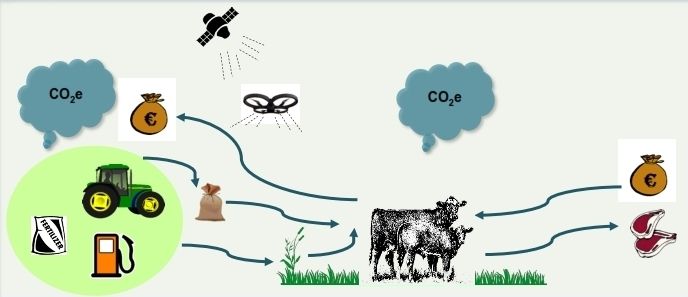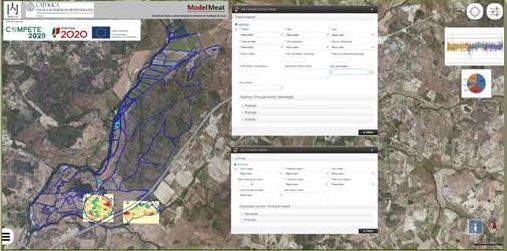ModelMeat
Projects / Scientific Research

The main goal of the project is to develop a decision support system for integrated sustainability management in the extensive livestock production sector. In the context of extensive farming, the ModelMeat results will be used by meat and dairy producers directly as well as by companies in the agri-food industry with such producers as suppliers.
ModelMeat is a partnership between Terraprima - Serviços Ambientais and Escola Superior de Biotecnologia of Universidade Católica Portuguesa, aiming at developing a model for sustainability management in the extensive meat industry.
The project has three components:
(1) For the animal, a model based on the Dynamic Energy Budget theory will be developed. Such model simulates the feeding, growth, maintenance and reproduction dynamics of the animal and will allow to estimate the animal performance, the characteristics of the resulting products (meat) and greenhouse gas (GHG) emissions.
(2) Upstream, management and feed practices will be characterized. Practices, such as consumption of materials, energy and food produced outside the farm, will be characterized economically and environmentally by means of a parametric Life Cycle Assessment. Such approach will allow to obtain indirect GHG emissions. Furthermore, a method will be developed to estimate pasture productivity and quality through aerial photography and satellite imagery complemented by in situ measurements.
(3) Downstream, products will be characterized in terms of nutritional, quality, safety and sensorial aspects. The consumer’s willingness to pay will be assessed.
Initially, the model is calibrated using data from the Alentejo region. However, the project will establish reproducible data collection, modeling and synthesis methods for other regions. A prototype computer tool for model implementation will also be developed.
The project started in October 2016 and is expected to end in September 2019. It is funded by the European Union's Portugal 2020 Program.
General Information
Technical Information
Project designation
- ModelMeat – A model for the optimization of product environmental and nutritional performance as a decision support service for the extensive animal production sector.
- 017630
- Improve research, technological development and innovation
- 017630
- 27,43% North region of Portugal
- 72,57% Alentejo region of Portugal
- Terraprima – Serviços Ambientais, Sociedade Unipessoal, Lda.
- Universidade Católica Portuguesa
- 30-08-2016
- 01-10-2016
- 31-12-2019
- 885.386,10 €
- FEDER – 645.294,03 €
Main Expected Results
- A decision support system for extensive animal production in ruminants, consisting on integrated modules or sub-systems for grazing management in farming and environmental practices, namely:
- An innovative and highly specialized grazing management system based on the estimation of pastures productivity using remote sensing techniques;
- A system for calculating the environmental impact of the extensive meat sector, based on the Life Cycle Assessment simple method;
- A system for determination of the economic costs of farming practices;
- An integrated model, based on biophysical processes, that correlates animal feeding with the quality and food safety of the product (meat);
- A system for simulating different productivity scenarios that tests the effects of different management practices and the consequent environmental and economic outcomes.
- A platform application with GIS module for the farm management, which will host all the decision support system - ModelMeat, and others relevant tools and information for the farmer.
Explore and discover






